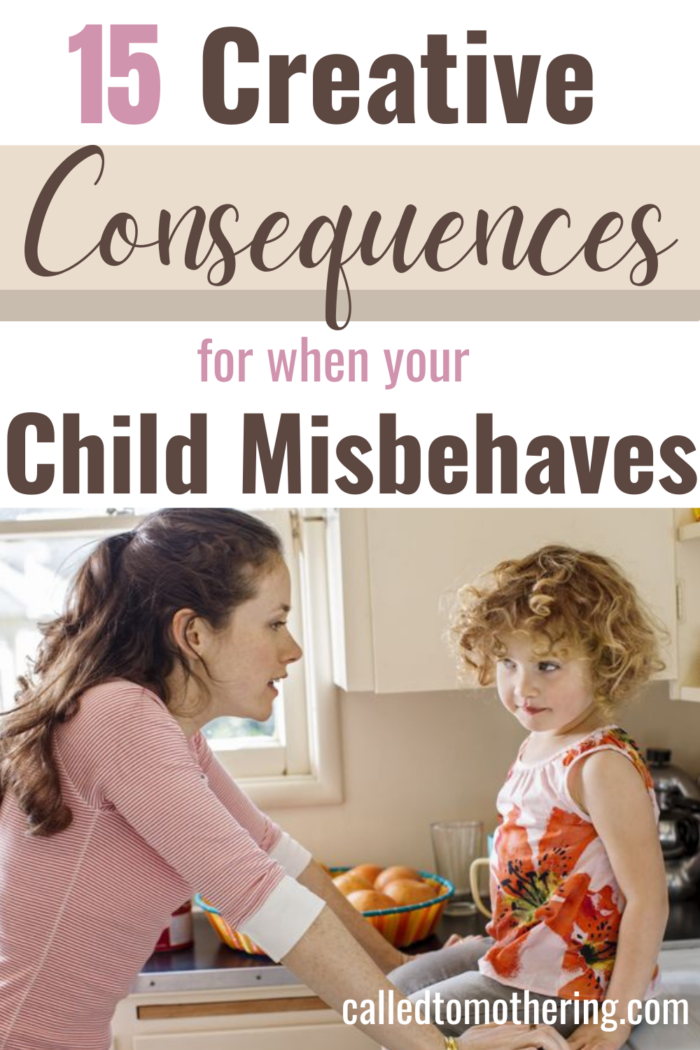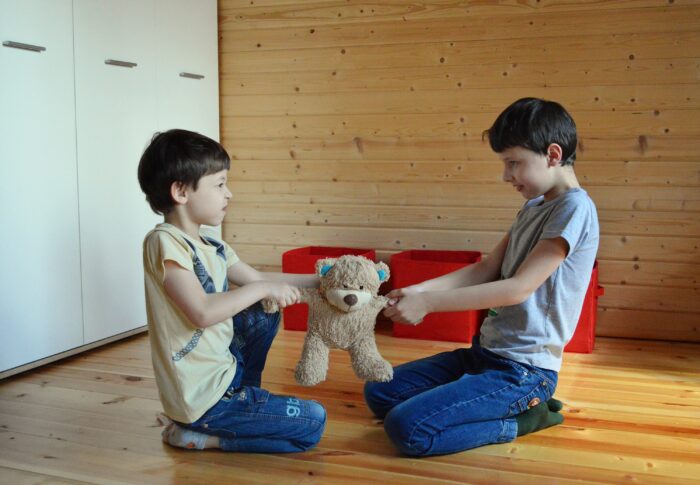
We all know that, in parenting, boundaries mean nothing without consequences. I can’t tell my child not to do something if I’m not ready and willing to hold him responsible for his behavior.
Rules really aren’t enforceable without some kind of accountability. And consequences bring both security and predictability to children.
But sometimes, we just can’t think of any consequences that would be effective in a certain situation.
Do we keep sending our kids to their rooms for a time-out? Do we take away every toy and activity until there’s nothing left?
Here are several creative consequences for different types of behavior, that are also compassionate and reasonable!

1. Relate Back to an Action
You want to make sure, as much as you can, that a consequence is somehow related to the offense.
If your child makes a mess, telling him “Go to your room and stay there” isn’t relevant to his behavior and he likely won’t learn anything from this. However, a consequence that does relate to the action would be “You need to clean it up.”
If you tell your daughter to come inside the house but she continues to ride her bike, she gets her bike taken away for a day. When your son continues to play on his iPad past the time he’s allowed, or throws a tantrum when you ask him to put it away, he loses access to it for an afternoon.
And if your child behaves badly during a playdate with her friends, the playdate is cut short and/or she’s not allowed to participate in a playdate the following weekend. This type of cause and effect is a very powerful lesson!
2. Moments of Silence
This is a simple, but effective consequence around our house. If a child speaks with an unkind tone or word, he is not allowed to speak for ten minutes.
After ten minutes of silence are finished, I give a brief chat about using words for kindness and share a relevant Bible verse.
3. Extra Practice
If a child does a household chore very sloppily (such as making the bed, sweeping the floor, or folding laundry) she has to repeat the chore two more times.
I kindly guide the child through the chore and show her the proper way to complete it.
Then, she has to repeat the chore — twice. This is an important consequence in order for children to learn necessary life skills!

4. Earlier Bedtime
Before bedtime I do a “house swoop.” For each item a child leaves around the house, they have to go to bed five minutes early.
For instance, if I find three items that belong to my son, then he has to go to bed 15 minutes earlier than normal. This keeps our house from becoming a scattered toy box or an over-turned laundry hamper!
I also love this logical consequence because I know firsthand that poor behavior is often a result of poor sleep habits. If this sounds familiar, consider moving up your child’s bedtime for each infraction throughout the day (i.e. for each tantrum your child throws, their bedtime is moved up by 10 minutes).
5. No Treats Earned
I’m constantly rewarding my kids for good behavior. At the same time, I will take away the privilege of getting to enjoy a special treat such as ice cream if someone refuses to eat dinner, or displays an unhelpful attitude with dinner prep or clean-up.
When I first saw my husband enforce this consequence, my heart melted for my daughter. I so wanted to enjoy some soft serve ice cream with her! However, when I saw her changed attitude the next day I knew this consequence was quite effective.
6. Disappearing Toys
If children refuse to share or frequently bicker over a specific toy, then that toy is removed from their possession. The toy can be returned when attitudes have improved.
Even if this takes days or weeks, do not return the toy until your kids have learned that fighting over toys is not allowed.
Also, if your child constantly leaves toys lying around the house, or refuses to clean his room when asked, put all toys that aren’t put away properly in a bin and take them away for an extended period of time.

7. Words and Letters of Appreciation
In order to resolve an issue between siblings and to focus on the positives, require your children to say 10 things they like about the other person. At times this will be difficult, but it’ll make your kids appreciate one another so much more!
If your child is old enough to write, have her write a letter of appreciation (or thank you note) to the family members or friends she has been unkind to. If she can’t write entire sentences, have her draw words and pictures.
Writing out emotions and seeing why she should love her siblings or friends is a great visual reminder of why she should always be kind.
8. Close Quarters
Paired with the last idea, have the offending siblings sit next to each other on the couch. Instead of allowing them to sit on opposite ends of the couch, make them share a seat cushion.
Sitting there for 10-20 minutes right next to each other, it will be difficult for your children to stay angry. By the end of the time they’re required to sit, they’ll most likely end up laughing or talking about things!
9. Removal From Fun
Many acts of disobedience or attitude issues happen in the midst of a crazy-fun activity. Use this opportunity as a super simple, but creative way to let your child know that hitting other kids or disobedience to parents is not allowed.
Remove your child from the fun for 10 or 15 minutes and explain to them that if they act properly, they can have fun too.
When out (at a park or dinner) and the child is misbehaving or being disruptive to other children, have them take a time-out and sit with a parent. This time together can be silent and reflective, or include talking through what events took place that led to sitting there.
When kids are taken out of fun, they learn what not to do next time so they can continue to maximize their time spent playing or engaged in an activity.

10. Empower With Choices
Maybe your child is pitching a fit or whining and needs to regain his self-control. Within reason, you can give him choices by saying something like, “You can either regain your self-control here, or you can go in your room and regain your self-control.”
With the child who made a mess you could say, “Would you like to clean this mess up by yourself, or would you like me to help you?” This would be for a young child, or one who might not be able to clean it up all by himself.
With this wording, the child knows that cleaning up is not the option. The option is, “Do you want help with it or not?”
Another example is, “You were disrespectful to your sister. Are you going to apologize in person, or by writing a letter to her?” The apologizing is not up for grabs, but how the child does it can be.
11. Deduct Time From Desirable Tasks
Say your child consistently argues with you about doing homework, dawdles in the morning, drags out her bedtime routine, etc.
Consider taking that additional time spent arguing about it away from more desirable tasks, like playing with friends, watching TV, or playing video games.
12. Allow a Do-Over
If you’ve caught your child in a lie, tell him something like, “I’m going to give you a few minutes to think about this, and then I’d love to hear the truth about what happened.”
This is usually enough for kids to feel “off the spot” and be okay with telling you the truth.
And when you find one of your children in a sticky situation, don’t ask questions that would encourage lying in the first place.
Don’t look at a child with a broken vase at his feet and say, “Who broke the vase?” Instead say, “You broke the vase, huh? What happened?” Try to use a voice that welcomes discussion, rather than one that invokes shame.

13. Extra Chores
If your child has a tendency to complain she’s bored or refuses to participate in activities, crafts, and games you organize on weekends and school holidays, a logical consequence would be to assign extra household chores. For example, tell her “I’d like to do X, but if you don’t want to participate, the other option is to help me with Y.”
Allowances are a great way to introduce financial responsibility to an older child. However, if a preteen is being disobedient, either decrease the initial amount, or supply more jobs in order to earn the allowance.
14. Take Away Freedoms
Tweens and teenagers especially want to feel independent and free. In the case that they misbehave, though, it is important to show that they cannot handle the freedom previously given.
One way to do this is restrict car use and outings alone. Or, when your child has an issue with devoting too much time towards electronics instead of homework or chores, take device privileges away for a certain period. In other words, take away the item that is taking up too much of their time.
15. Natural Consequences
Making excuses when our kids slack off in their schoolwork, double checking to make sure they’ve packed their lunch or assignments, and constantly reminding them to do their chores won’t do them any favors.
Letting them experience the natural outworking of their actions fully is important! If your child drags his feet while he’s supposed to be getting ready, let him miss out on a scheduled activity or go to school in his pajamas.
When you keep rescuing him, your child will believe help is readily available at the slightest inconvenience and won’t learn his lesson! In life if you dawdle and don’t get your work done, you usually lose an opportunity. Let your kid learn that principle now while he’s young.

We need to remember that our place as an authority is to educate our children in making wise choices by thoughtfully and intentionally giving them consequences for their behavior. Our authority needs to be gracious, but we can still be firm and help our children learn.
Whether your kid is lying, hitting, throwing temper tantrums, using manipulation, gossiping, not listening, being disrespectful or out of control, providing straight-forward, reasonable consequences has the power to change their bad behavior!
Be sure to also read:

Leave a Reply
You must be logged in to post a comment.